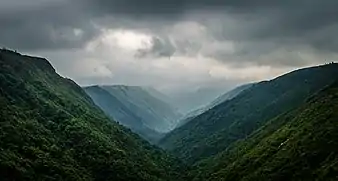Khasi Hills
The Khasi Hills /ˈkɑːsi/ is a low mountain formation on the Shillong Plateau in Meghalaya state of India. The Khasi Hills are part of the Garo-Khasi-Jaintia range and connects with the Purvanchal Range and larger Patkai Range further east. Khasi Hills, and the whole Garo-Khasi-Jaintia range, are in the Meghalaya subtropical forests ecoregion.

Khasi Hills, and the entire Meghalaya state was administratively part of Assam before 1970. In older sources in particular, the alternative transcription Khasia Hills is seen.[1]
The region is inhabited mainly by tribal Khasi dwellers, which are traditionally in various chieftainships, states known as the Khasi Hill States. One of its capitals, Cherrapunji, is considered one of the wettest places in the world.[2]
The region came under the Khasi Hills district, which was divided into West Khasi Hills and East Khasi Hills districts on 28 October 1976.[3]
The highest peak is Lum Shyllong which is 1,968 metres (6,457 ft) high.[4] It is situated a few kilometers south of Shillong town.[5]
Administration
Administratively, the Khasi Hills used to be a part of the Khasil Hills district.[6] The district was divided into East Khasi Hills district[7] and West Khasi Hills district on 28 October 1976. On 4 June 1992, the Ri-Bhoi District was carved out of the East Khasi Hills District.
See also
References
- Sarkar, A.B. Chaudhuri & D.D. (2003). Megadiversity conservation : flora, fauna, and medicinal plants of India's hot spots. Delhi: Daya Publishing House. ISBN 8170353017.
- Bhaumik, Subir (28 April 2003). "World's wettest area dries up" (stm). South Asia News. Calcutta: BBC. Retrieved 21 February 2008.
- Bhattacharjya, Umasaday (1980). Local government in Khasi Hills. Vivek, 1980. p. 263.
- Karlsson, Bengt G. (2010). Unruly hills : a political ecology of India's northeast. New York: Berghahn Books. ISBN 0857451049.
- Riggins, ed. by Stephen Harold (1990). Beyond Goffman : studies on communication, institution, and social interaction. Berlin [u.a.]: Mouton de Gruyter. ISBN 3110122081.CS1 maint: extra text: authors list (link)
- Shangpliang, Rekha M. (2010). Forest in the life of the Khasis. New Delhi: Concept Pub. Co. ISBN 8180696677.
- "East Khasi hills". Government of India. Retrieved 15 August 2012.
Further reading
- Yule, Henry (1844). "Notes on the Khasia Hills, and people". Journal of the Asiatic Society of Bengal. 14 Part 2, Jul–Dec (152): 612–631.